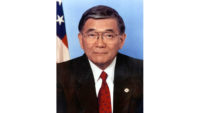American Society of Civil Engineers President Randall Over said that “the nation has lost a great champion for infrastructure.”
Oberstar “combined an encyclopedic knowledge of intermodal transportation issues with a practical ability to forge consensus among parties with divergent perspectives,” said Pete Ruane, American Road & Transportation Builders Association president and CEO.
Ruane credits Oberstar with playing a major role in producing surface-transportation bills that were enacted in 1991, 1998 and 2005.
Todd Hauptli, American Association of Airport Executives president and CEO, says, "Jim Oberstar was Mr. Aviation while in Congress and many of the major policy initiatives over the past two decades had his fingerprints on them."
According to Hauptli, Oberstar—who had led the aviation subcommittee before chairing the full committee—at first was skeptical about the idea of a new fee on air travelers whose proceeds would go for airport infrastructure projects.
But he adds that Oberstar "became convinced that it was the right approach" and pushed for its approval.
The passenger facility charge was instituted in 1992 and since then, receipts have totaled $41 billion for airport infrastructure.
After his defeat, Oberstar was a visiting scholar at the University of Minnesota Humphrey School of Public Affairs and at the University of Minnesota-Duluth. He also was a senior advisor at Washington, D.C., consulting firm National Strategies LLC.
Oberstar was born on Sept. 10, 1934, in Chisholm, Minn. According to the U.S. Congress Biographical Directory, he received a bachelor’s degree in 1956 from the College of St. Thomas in St. Paul, Minn. He majored in French and political science.
He later earned a master’s degree from the College of Europe in Bruges, Belgium. Oberstar also taught in Haiti. Years later, during congressional hearings, he occasionally would shift from English to French.
Jim Berard, Oberstar's long-time committee spokesman, said via email that when he began work as his communications director in 1987, people would ask where he worked. Berard told them he worked for Jim Oberstar. He recalls that "almost invariably their reaction would come in two words: 'Good man.' "
He adds, "I can't think of any phrase that sums up Jim's character and dedication better than those two words."
Hauptli says, "If he cared about you, he was all in."



Post a comment to this article
Report Abusive Comment